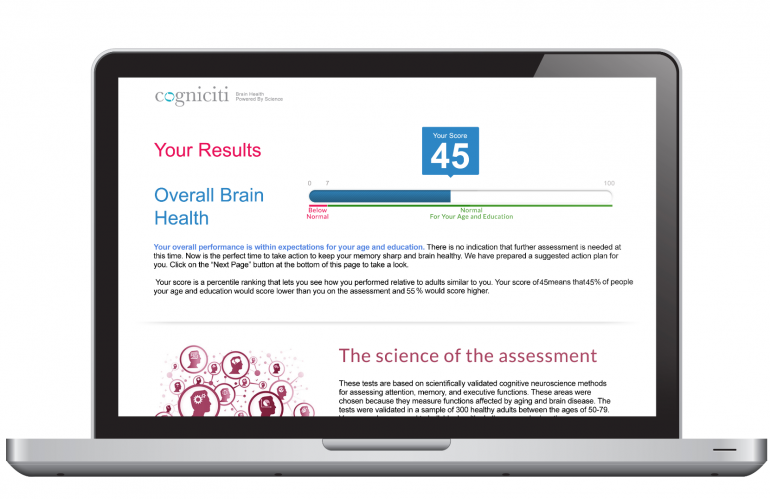A new tool launched this week to help people who are worried about memory loss. It detects the signs of brain health problems early, and helps people get treatment.
The new self-assessment brain health test developed by Toronto’s Cogniciti claims that its 20-minute test has been clinically proven, unlike other similar tools on the “brain fitness” market today. It gives people a score on how well their brain is doing compared to others of the same age, with more clarity on how their memory, attention and cognitive abilities function. The test feels like a game, but there’s science behind it.
What if millions of people could detect Alzheimer’s early enough to start the treatment when it’s most effective? “Getting checked early is the best way to rule out other health problems that could be causing your cognitive issues,” said Dr. Angela Troyer, program director of Neuropsychology and Cognitive Health at Baycrest, and a lead member of the research team that developed the test.
Cogniciti president Michael Meagher said it took the company three years from identification of the need, to coming up with an idea on how to address it, to the completion of the clinical research and development of the technology based on that research.
“There are hundred million adults in Canada and US, and over 90 per cent of those people have enough of a concern about their brain health that they’re looking for a private, convenient assessment that is clinically researched to see what the right time would be to discuss any concerns with the doctor,” Meagher told BetaKit. “The key issue is determining when simple forgetfulness becomes something more serious.”
Cogniciti co-developed the brain test with help from Baycrest, which owns the majority of shares in the company and was responsible for much of the clinical research. MaRS, a minority shareholder, helped establish Cogniciti and provided expertise on usability of the test, positioning, business plan development and marketing, according to Martin Sumner-Smith, senior advisor with MaRS Health Venture Services.
Going forward, Cogniciti hopes to expand the age range, make the test available to more people, and provide greater depth of information to tell people more about their memory, attention and judgement, and to study how the test performs with people who have been clinically diagnosed with early stages of dementia.
Cogniciti.com pulls information from hundreds of different sources and focuses on prevention, like this Ontario Brain Institute study that shows how regular exercise can reduce the risk of Alzheimer’s and dementia by 40 per cent.
Now that Cogniciti has launched its brain health test, it needs to find ways to evolve and become financially sustainable. “We would be an interesting partner for health-care funders and other organizations dealing with the needs of people over 50, so we can put this tool to work and help many more people,” Meagher said. Everyone under 50 can also take the test, in the spirit of helping science.


